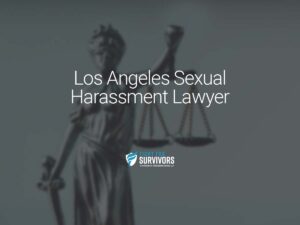
Sexual harassment in the workplace, whether through unwanted advances, comments, or inappropriate behavior, can significantly impact an employee’s ability to work effectively. Both men and women can be survivors, and California law provides robust protections to ensure a harassment-free work environment. Employers are required to investigate complaints and maintain a safe workplace, regardless of the company’s size.
If you have experienced sexual harassment, documenting incidents, reporting them to HR, and consulting with a skilled attorney can help you navigate the legal process and safeguard your rights. Our team at Greenberg Gross LLP is here to support you every step of the way.

Understanding Sexual Harassment in Los Angeles
Sexual harassment is a form of sex discrimination prohibited under California and federal laws. It includes:
- Unwanted sexual advances.
- Requests for sexual favors.
- Other conduct of a sexual nature that interferes with an individual’s work performance or creates a hostile environment.
In Los Angeles workplaces, harassment can manifest through inappropriate physical contact, sexual comments, lewd jokes, or offensive remarks. These behaviors often create an intimidating or uncomfortable environment, making it challenging for employees to perform their duties.
Key points to understand:
- Gender Neutrality: Both men and women can be survivors, and harassment can occur between individuals of the same sex.
- Underlying Dynamics: Harassment is often rooted in a desire for control and subjugation rather than genuine sexual interest.
Every employee has the right to a safe, harassment-free workplace under California law.
Types of Sexual Harassment in the Workplace
1. Quid Pro Quo Harassment
- This occurs when a supervisor or someone in power demands sexual favors in exchange for job-related benefits, such as promotions, raises, or continued employment.
- Such actions exploit workplace power dynamics and are strictly illegal.
2. Hostile Work Environment
- This form of harassment involves pervasive behaviors that create an intimidating or offensive workplace.
- Examples include repeated lewd jokes, inappropriate comments, and unwanted physical contact.
Both types of harassment can severely affect an employee’s mental health, confidence, and ability to work. Recognizing these forms is the first step in addressing and preventing workplace harassment.
Legal Protections Against Sexual Harassment in California
California provides comprehensive legal protections against sexual harassment under both federal and state laws:
1. Title VII of the Civil Rights Act of 1964
- Applies to workplaces with 15 or more employees.
- Employers are required to take immediate and appropriate action to investigate harassment allegations.
2. California Fair Employment and Housing Act (FEHA)
- Offers broader protections than federal law, applying to employers regardless of size.
- Mandates anti-harassment policies and protects employees, job applicants, interns, and contractors from harassment.
Both laws hold employers accountable for addressing and preventing sexual harassment. If a supervisor engages in harassment, employers are strictly liable. Employers may also be held responsible for coworker harassment if they knew about it and failed to act.
Steps to Take If You Are Sexually Harassed at Work
If you experience sexual harassment, these steps can help protect your rights and strengthen your case:
- Document the Incidents
- Keep detailed records, including names, dates, times, locations, and witnesses. Save all evidence, such as emails, messages, or explicit photos.
- Report the Harassment
- File a written complaint with your supervisor or HR department. This creates a formal record of the harassment.
- If the employer fails to address the issue, escalate it to higher management, a union representative, or civil rights agencies.
- Consult a Sexual Harassment Attorney
- An experienced lawyer can guide you through the legal process, evaluate your case, and help file a claim if internal procedures do not resolve the issue.
Taking these steps helps protect your rights and contributes to a safer workplace for others.
Reporting Sexual Harassment in Los Angeles
Reporting harassment is a critical step in seeking justice and preventing future incidents. Here’s how to proceed:
1. Report Internally
- Notify your supervisor or HR. Submit your complaint in writing to ensure proper documentation.
2. Use Civil Rights Agencies
- If your employer fails to act, file a complaint with:
- These agencies will investigate your complaint and may issue a “right to sue” letter if unresolved.
3. Escalate to Legal Action
- If internal and agency resolutions are inadequate, consult an attorney to file a lawsuit and pursue justice.
Employers in California are legally obligated to address all harassment complaints, regardless of their severity or formality.
Online Sexual Harassment in the Workplace
In the digital age, online sexual harassment has become increasingly common, taking the form of offensive emails, social media messages, or inappropriate images shared through workplace channels.
If you experience online harassment:
- Document all incidents and save digital communications.
- Report the harassment to your supervisor or HR.
- Consult a sexual harassment attorney to evaluate your legal options.
Promptly addressing online harassment is essential to maintaining a safe and professional workplace.
How Greenberg Gross LLP Can Help
At Greenberg Gross LLP, we are committed to helping individuals who experience workplace sexual harassment. Our experienced attorneys:
- Provide free consultations to discuss your case confidentially.
- Help you document incidents, gather evidence, and navigate the legal process.
- Advocate for your rights in court to pursue justice and compensation.
Contact us today for a free consultation to learn more about your legal options and take the first step toward a harassment-free workplace.
Frequently Asked Questions
What constitutes sexual harassment in the workplace?
Sexual harassment includes unwelcome sexual advances, requests for sexual favors, and other conduct of a sexual nature that creates a hostile or intimidating environment.
How do I report sexual harassment in Los Angeles?
File a complaint with your supervisor or HR in writing. If unresolved, escalate the issue to agencies like the EEOC or DFEH, and consult a sexual harassment attorney for additional support.
What are the legal protections against sexual harassment in California?
California’s FEHA and Title VII of the Civil Rights Act mandate that employers maintain safe workplaces and address harassment complaints. FEHA applies to employers of all sizes.
What should I do if I experience online sexual harassment?
Document incidents, notify your employer, and consult a sexual harassment attorney to address the issue effectively.
How can Greenberg Gross LLP help with my sexual harassment case?
We provide free consultations, expert legal guidance, and representation to help you navigate your case and pursue justice.